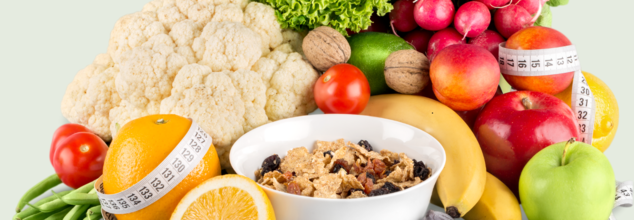- Health Conditions A-Z
- Health & Wellness
- Nutrition
- Fitness
- Health News
- Ayurveda
- Videos
- Medicine A-Z
- Parenting
- Web Stories
Lower Dementia Risk By 25% By Making These Changes

(Credit-Canva)
Eating healthy and protecting your body from processed chemicals has been the goal of many people for the past few years. As more and more people are becoming aware of how junk and processed foods affect our health, they are changing their diet and making healthier choices. However, a point of concern for many people lies in their age. Does it make a difference, changing your diet later in life?
You can start protecting your brain health through your diet at any point in life, according to a new study. People who improved their healthy eating habits in middle age saw a 25% lower risk of developing dementia, compared to those whose diets got worse over time. These exciting findings were shared at a recent meeting of the American Society for Nutrition (ASN).
Researchers stated that the study's results confirm that healthy eating patterns in mid to late life, and improving those patterns over time, can help prevent Alzheimer's and related forms of dementia. This clearly suggests that it's truly never too late to adopt a healthy diet as a way to guard against dementia.
How the Study Was Conducted
For this important study, researchers looked at information from almost 93,000 adults who were part of a long-term health study. These people were between 45 and 75 years old when the study began in the 1990s. Over the years, more than 21,000 of them developed Alzheimer's disease or other forms of dementia. Everyone in the study filled out food questionnaires, which helped researchers see how closely they followed the MIND diet.
The MIND diet is a special eating plan that combines the best parts of two other healthy diets: the Mediterranean diet and the DASH diet (which helps lower blood pressure). Both of these diets are known to make people healthier. According to the Harvard T.H. Chan School of Public Health, the MIND diet focuses on eating more whole grains, vegetables, nuts, beans, berries, chicken, and fish. It also suggests eating less pastries, sweets, red meat, cheese, fried foods, and butter.
Significant Drop In Risk And Visible Changes
The study found that people who followed the MIND diet from the start had a 9% lower chance of getting dementia. Even better, there was a 13% bigger drop in risk for Black, Hispanic, and white people. The researcher noted that healthy eating helped these groups more, but it wasn't as clear for Asian Americans and Native Hawaiians. This suggests that advice about diet might need to be different for different groups of people.
Perhaps the most encouraging discovery was that people whose diets got closer to the MIND diet over 10 years had a huge 25% lower chance of getting dementia. This was true even if they didn't follow the diet perfectly at first. This really shows that making positive changes to your diet later in life can still have a big positive impact on your brain health.
Healthier Food Choices For Brain Health
Just like there's no magic pill for a sharp mind, no single food will keep your brain perfect as you age. Harvard Health Publishing says the best approach is to eat a generally healthy diet. This means focusing on lots of fruits, vegetables, beans, and whole grains for overall brain health.
Green, Leafy Vegetables
Leafy greens like kale, spinach, and broccoli are packed with nutrients vital for your brain, such as vitamin K and folate. Studies suggest eating these greens can help slow down memory loss and keep your thinking sharp as you get older.
Fatty Fish
Fish like salmon and cod are full of omega-3 fats, which are healthy fats linked to lower levels of a protein that harms brains with Alzheimer's. Aim to eat fish at least twice a week, choosing options low in mercury like light tuna.
Berries
The bright colors in berries come from plant parts called flavonoids, which research shows can also improve memory. Eating berries like strawberries and blueberries regularly may help delay memory problems by a few years.
Tea and Coffee
The caffeine in your daily tea or coffee might do more than just wake you up. Studies suggest that people who consume more caffeine often score better on memory and thinking tests, and it might even help you remember new things.
Walnuts
Walnuts are a great source of protein and healthy fats. Studies link eating walnuts to better scores on memory and thinking tests. They contain a special omega-3 fat that helps keep your blood pressure down and arteries clean, benefiting both your heart and brain.
A Low Calorie Diet Could Be The Reason For Your Declining Mental Health

(Credit-Canva)
Being hungry and annoyed is a very common occurrence. Hunger can sometimes trigger many different emotions, make things seem much more difficult than they are and generally be difficult to deal with. However, hunger and mood swings are much more serious than you might think.
A new study suggests that counting calories might not just be unpleasant; it could actually increase your risk of depression. The research, published on June 3 in BMJ Nutrition Prevention & Health, found that people on low-calorie diets showed more signs of depression compared to those not dieting.
Who's Most Affected?
The study's results showed that overweight people and men seemed to be especially vulnerable to these mood changes when they were on a low-calorie diet. Experts noted that diets restricting calories were linked to higher depression scores, which goes against what some earlier studies found. They also added that men and overweight individuals appear to be more sensitive to the negative effects of limiting what they eat. Researchers believe that cutting calories might also deprive the brain of important nutrients it needs to keep your mood steady.
How the Study Was Done
For this research, scientists looked at health information from over 28,500 people who participated in the U.S. National Health and Nutrition Examination Survey between 2007 and 2018. Everyone in the study answered questions about depression symptoms and whether they were following any specific diet.
In total, a little less than 8% of the people in the study reported having symptoms of depression. The researchers then sorted everyone based on their eating patterns. This included diets that limited calories, diets that cut out specific nutrients like carbs or fat, or diets designed to help manage health problems like diabetes or heart disease. About 87% of the people weren't on any special diet, while 8% followed a low-calorie diet, 3% limited certain nutrients, and 2% followed a diet for health reasons.
Surprising Results
The study's findings indicated that those on diets that restricted calories had higher depression scores than those who weren't dieting. Even more, overweight people who were either eating fewer calories or limiting certain nutrients had even higher scores. The study also found that any kind of diet at all seemed to affect men's moods.
These results directly go against what some earlier studies had found, which suggested that low-calorie diets might actually help with depression. The researchers explained that this difference might be because previous studies were often carefully controlled experiments where people followed specific diets designed to ensure they got all the necessary nutrients. In everyday life, cutting calories can often lead to not getting enough important nutrients and can cause stress, which might make depression symptoms worse.
For example, the brain needs things like glucose (from carbohydrates) and fatty acids (like omega-3s) to work well. The research team wrote that diets low in these can, in theory, make brain function worse and increase emotional symptoms, especially in men who might need more nutrients. People on such diets might also become depressed if they don't lose weight or if their weight goes up and down.
As Father's Day Approaches, Food Habits Dads Must Adopt To Take Better Care Of Their Health

Credits: Canva
Father's day is around the corner and no gift is better than that of a good health! Fathers guide, support, and nurture their families and they also need care. In the struggle of prioritizing work, men often put their health on backseat, so this father's day, let's flip this.
with age, men become more vulnerable to certain health issues, these are linked to the heart, kidneys, liver, brain, prostate, and their cholesterol levels. However, there are simple and everyday choices that can go long way in preserving health and preventing illness.
Eat Smart For Your Heart
As per the National Institutes of Health, cardiovascular diseases develops 7 to 10 years later in women than in men. As per MedStar Health, men tend to have their first heart attack an average of 10 years earlier than woman. Other studies too show that men are more prone to heart diseases at a younger age. However, small dietary changes can make a difference.
To support their function, antioxidant-rich fruits such as blueberries, red grapes, and cranberries can be helpful. They help fight inflammation and oxidative stress—both of which can harm kidney tissue. Vegetables like red bell peppers, garlic, and onions are rich in vitamins and anti-inflammatory compounds that further protect kidney health. For protein, wild-caught salmon and egg whites are considered kidney-friendly and lower in phosphorus.
Keep Your Liver Clean
A healthy liver is crucial for detoxifying the body and processing nutrients. Foods that support liver health include berries, cruciferous vegetables like broccoli and cauliflower, and leafy greens. These are high in antioxidants and help the liver do its job more efficiently. Again, omega-3-rich fish comes into play here, helping reduce fat buildup and inflammation in the liver.
Food For Healthy Brain and Prostate Health
Cognitive decline is a common concern as men age. To support brain health, it's important to prioritise foods rich in omega-3s, antioxidants, and folate. Spinach, kale, walnuts, flaxseeds, and of course, fatty fish, help nourish the brain and may even delay age-related decline. A healthy brain supports not just memory, but also mood, decision-making, and quality of life.
Prostate health becomes a critical concern after the age of 50. Tomatoes, which are rich in lycopene, may help reduce the risk of prostate cancer. Cruciferous vegetables like broccoli contain sulforaphane, known for its cancer-fighting properties. Regular intake of these, combined with omega-3 fatty acids, helps keep inflammation down and promotes better prostate function.
What Helps You Manage Cholesterol
High cholesterol can quietly pave the way for heart problems. Soluble fibre from sources like oats, legumes, and certain fruits helps lower LDL cholesterol. Foods fortified with plant sterols—like some cereals and spreads—can also reduce bad cholesterol levels. And don’t forget the role of healthy fats from nuts, seeds, and avocados in keeping the good cholesterol up.
Do You Need More Protein Or Just The Right Kind? Dietician Explains How To Make Smarter Choices

When it comes to nutrition buzzwords, protein is having a long-standing moment. It's promoted by fitness influencers, stamped across packaging, and touted as the secret to everything from muscle tone to satiety. But here’s the real question that deserves attention—do you actually need more protein, or do you just need smarter protein?
As the conversation around protein deepens, experts are calling for a shift in focus—from more to better. Ahead, we dive into what science and dietitians say about protein requirements, the risk of deficiency, and how to choose protein sources that are not just effective, but smarter for your long-term health.
Protein isn’t just for bodybuilders. It's a fundamental building block of life, essential for the structure and function of your muscles, skin, enzymes, hormones, and nearly every cell in your body. Alongside carbohydrates and fats, protein is a macronutrient—meaning your body needs it in large amounts to function properly.
"Protein is critical not only for muscle repair but also for immunity, metabolic function, and hormone regulation," explains Dt. Vaidehi Nawathe, Chief Dietitian at Bhaktivedanta Hospital & Research Institute. “Its role in health spans far beyond just bulking up at the gym.”
Are You Getting Enough Protein? Signs of Deficiency
Despite its importance, many people may be consuming far less protein than they actually need, especially in developing countries and even among affluent urban populations.
Common signs you may not be getting enough protein include:
- Feeling hungry shortly after meals
- Fatigue or lack of energy, especially post-workout
- Poor recovery after illness or exercise
- Hair thinning, brittle nails, or weakened skin integrity
“If you're constantly snacking, feel sluggish or take longer than usual to bounce back from workouts or the flu, protein might be lacking in your diet,” says Nawathe.
Also Read: Not Cleaning Your Face Before Sleeping? These Tiny Bugs Might Be Feasting On Your Skin
Experts note that satiety and muscle recovery are strong indicators of adequate protein intake. If you feel full between meals and recover well, you're likely meeting your protein needs.
What Are Standard Protein Requirements?
How much protein you need daily depends on a variety of factors: age, gender, body weight, activity level, and overall health goals. On average:
- 10–15 grams per snack
- 20–35 grams per meal
Yet numbers only tell part of the story. Instead of obsessing over numbers alone, focus on making smarter protein choices that deliver more than just amino acids.
Hidden Protein Deficiency Crisis
Protein deficiency is a global health concern—but not in the ways we often imagine. According to Nawathe, “Protein deficiency is not just a problem of poverty or undernourishment. It’s surprisingly rampant even among the urban rich.”
In India alone, an alarming 73% of the urban population is protein deficient, often consuming only 10 to 30 grams per day, when the recommended intake ranges between 60 to 90 grams. That’s a serious gap, especially for pregnant women, older adults, and those recovering from illness.
Unlike iron or calcium deficiencies, protein deficiency often goes unnoticed, leading to chronic fatigue, poor immunity, and long-term health complications.
It’s not just about how much protein you consume, but what kind.
“There are endless protein powders on the market, but not all are created equal,” warns Nawathe. Her recommendation? Look beyond standard whey or meat-based options and explore plant-based protein powders—particularly those fortified with fiber, probiotics, and omega-3s (like DHA).
Smart protein choices include:
- Pea protein + Brown rice protein blends
- Formulas that include prebiotics and probiotics for gut health
- Low-GI protein options for blood sugar control
- Protein enriched with DHA for brain and heart support
These blends are not just good for muscle synthesis but also improve gut health, aid nutrient absorption, and support maternal health, particularly by reducing risks of gestational diabetes and preeclampsia in expectant mothers.
Also Read: Pop Star Jessie J Diagnosed With Early-Stage Breast Cancer; What Are The Signs Women Often Ignore?
Animal Protein vs. Plant Protein
While red meat and dairy-based proteins offer complete amino acid profiles, they may not be the best long-term choices for everyone.
“Animal protein, especially red meat, is high in saturated fats and cholesterol, which raises the risk of cardiovascular disease and some cancers,” says Nawathe. In contrast, plant proteins are anti-inflammatory, gut-friendly, and often more digestible.
Moreover, protein powders that taste good and mix well enhance compliance—because people are more likely to stick with nutrition habits that feel enjoyable.
The protein conversation is no longer about extremes. It’s about mindful nutrition—choosing sources that are holistic, balanced, and tailored to your needs.
If you're unsure about your protein intake or whether you're consuming the right kind, consult a registered dietitian who can assess your lifestyle, body composition, and health history.
Dt. Vaidehi Nawathe is Chief Dietitian at Bhaktivedanta Hospital & Research Institute in India
© 2024 Bennett, Coleman & Company Limited

